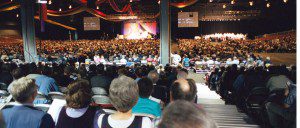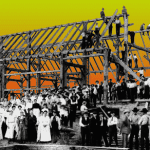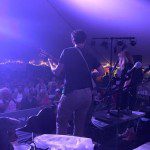*For those not familiar with the Christian Church (Disciples of Christ), we have a General Assembly every two years where all Disciples are invited for a multi-day gathering. While some value the current model greatly and want to ensure it keeps going, some prefer to see it change radically. Still others simply don’t participate at all, not seeing a space or voice for themselves within it. Currently, there is a bit of a financial crisis regarding its sustainability, which has raised more conversations about what should be done. I’ve commented publicly on this and have received lots of feedback from all sides. So I thought it was time to more formally put my thoughts in one place.
 Dear friends, most particularly connected to the Christian Church (Disciples of Christ):
Dear friends, most particularly connected to the Christian Church (Disciples of Christ):
Wanted to kind of pull together the ideas from my recent comments about General Assembly and what we might do instead. First, I commented wrongly that we require paid-for badges to get into General Assembly worship. That was misinformed. Sorry for passing on bad info. My bad.
Next, this was founded in a sense that I get from many, many people that the current model doesn’t work for them, for a number of reasons. They can’t get away from their congregations. They and/or their parishes lack the funds. They simply don’t get anything from spending so much time in small rooms in a convention center. And so on.
On the other side, some are dealing with real anxiety that the financial model for the assembly is untenable. There were fears that this assembly wouldn’t break even, and apparently we lack some funding we need for future assemblies. And to that end, there are some, honorably so, scrambling to gather resources to keep it going.
I understand and admire this commitment. But I think this is a sign that it’s time for a change.
Andra Moran made a very valid point, that she recognizes so many who have put so much, and get quite a bit, from this current model. and as such, we are bound by a responsibility to honor that. Also, we need to bear in mind with any changes, not to make a major shift in a new direction that, then, marginalizes those who can’t participate based on physical ability, financial resources, or simply because they don’t feel they are recognized, included and valued. All important truths to bear in mind.
So what do we do?
I’m not going to suggest that I have a ready-made blueprint in my back pocket, but I have been helping organize events to some degree, and have been in talks to plan something on a much larger scale, like a west coast version of Wild Goose. So as such, I’ve gathered some wisdom and experience from a lot of folks with a lot of great ideas.
First, any model we employ should consider our original heritage. As Disciples, we were birthed in revival, from the ecstasy and passion summoned at Cane Ridge. That revival event was just that: a happening that no one could have expected to do exactly what it did. Yes, it was intentionally planned and organized, but it also was wide open in other respects, making room for the incoming of the Spirit. Some feel that we may over-plan things in the current model, replacing spontaneity with tight schedules and choreographed events.
Second, the convention center model requires such a commitment of money that we then become bound by it. We have to make that money back to sustain it. That inherently crates potential for tension and other problems that it’s hard to avoid from there, forward.
Third, a lot of people – especially younger people, but also others – simply don’t find the structured workshop model to be of great interest. Something I hear a lot from younger people – clergy included – is that “we don’t like being talked at.” I know we’ve done some to respond to this with things like the World Cafe model. This is good, but I think we can do more.
So what might that look like?
I think by design it has to be an urban setting, given requirements for flying in, hotels and the like. Within a city setting, though, I think we can look at other compelling models to help us.
Consider Austin’s South by Southwest. You come to the city, there are meetings and gatherings at local hotels and such for those who want them, and then there are fun events all over the city for several nights. You can go to the ones you want to participate in, move around, or simply do something else. But it’s more about creating a larger space in which people have a reason to come together, though it’s not all necessarily in one “place.”
Second, we need to employ remote technology. Many, many people want to be able to follow a live webcast or at the very least, subscribe to a podcast where talks and worship and such are offered all at once or over time. This way those who are physically or financially limited (or by time) can connect at least in some way.
Third, consider the “pay what you can” model. This has been employed by many entertainers like Radiohead to great effect. If it’s your first time and just want to check it out, you can offer a few bucks . If you love it, offer more to keep it going. If you’re a legacy Disciple who wants to see others be able to come who can’t pay for it, give more. Maybe a lot more. Now, some will suggest that we just won’t raise enough this way. But in a supply-demand system, wouldn’t this suggest that this means something needs to change? When you offer something in which your attendees see value, they tend to invest to keep it going.
And yes, I’m a fan of the Wild Goose Festival. It’s hardly perfect, and they deal with financial struggles too. But I’d recommend some of the same things to them that I recommend here, like placing the festival in or near a city, recruit local mainline churches (not just Disciples Churches) to hold events in their spaces, and to offer volunteers to host us. We do this for Sunday worship sometimes, but what about beyond that? Surely covering their basic costs for hosting would be less than leasing a whole convention center.
Also, we have SO MUCH talent within the Disciples of Christ. In the evenings, or even during the day, why not have exhibitions where our blessed musicians, artists, podcasters, dancers and multimedia experts can create an experience based around the theme to engage and maybe even entertain people. And if done right, some of these events really will attract others who aren’t part of the rest of the Assembly to join us. And to me, this is a GOOD THING.
Further, we should indeed seek to leave a positive footprint on any space where we descend. We do this to some degree, but maybe rather than planning it as much, we include resources in our registration of local needs, events to take part in or volunteer coordinators to contact so we can also make a sort of mission trip out of the assembly before, during or after.
But what about all coming together? Yes, this is important. I get that. At the same time, sitting in the dark in chairs, facing a stage and then leaving may not be the ideal way to feel togetherness. For me, the “Beer and Hymns” model is an amazing way that gathers people to celebrate in worship and join in one voice. No, you don’t necessarily need beer to invoke this spirit, but what it does is break down the stuffiness, expectations of “sit down and be quiet” worship models to loosen people up. Maybe there’s something about this model we can learn from. Curious what it looks like? Come across the street from the convention center to Barley’s right after worship to join us for a Beer, Books and Hymns!
Finally, we do need to find ways to honor the efforts so many have invested to get us here. This is one of the challenges my wife, Amy Piatt, and I have in ministering to a historic 135-year-old downtown church. We want to introduce the new, while not losing sight of the importance of our past, our story, our tradition. But from our experience, this is possible.
These are at least the thoughts that come to mind on a Sunday morning as I plan for our Beer and Hymns tonight, along with two live Homebrewed Christianity CultureCast events tomorrow and Tuesday (all of which are off-site, not formally related to the assembly, but which are expected to be at full capacity). When I critique what we’re doing, it’s always done in love and with the hope that we can keep something good going together. Otherwise, I’d simply say nothing, and would not participate at all.
May we dream dreams and achieve incredible things together that most of us have yet to even imagine. AMEN.
















